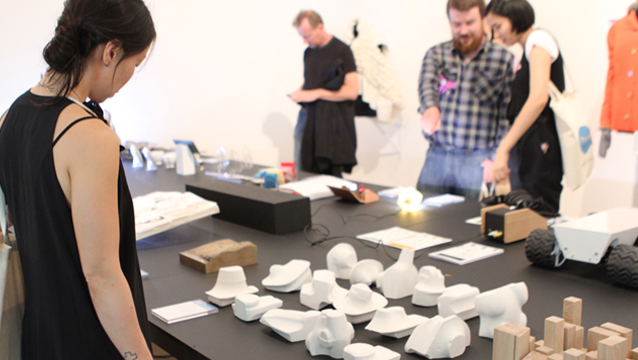
Archive
Here is an archive of blog entries.
First quarter: research through design fiction
Posted on 27 September 2013

It’s been a busy first few months, working along two strands: conducting interviews with interaction designers and creative practitioners about their work, and exploring opportunities for case studies to focus more in-depth inquiry.
As part of the case study exploration, I’ve been involved in organising a new conference called ‘Research Through Design‘, held at the Baltic Mill, Newcastle. This conference, envisioned by Jayne Wallace and Joyce Yee, experimented with a new format to enhance the presentation and dissemination of creative, practice-based research. RTD incorporated a curated exhibition of artefacts alongside peer-reviewed paper presentations; the presentations formed round-table discussions with delegates, with the exhibition artefacts ‘to-hand’ at each session to illustrate and demonstrate the work. We are currently gathering feedback from participants and delegates on the RTD experience, to evaluate this format. In the meantime, some reviews of the conference are available online: Vicky Teinaki’s conference summary; Carolina Figueroa’s summary on selected works; Richard Banks’ notes on Rachel Wingfield’s keynote; Richard Banks’ notes on Session 1, Day 1; Jon Rogers’ storify piece. A flickr group also captures the conference.
Alongside this, I’ve been exploring a practice-based research approach called design fiction, and, specifically, what it means to use this approach to collaborate with interdisciplinary research teams. One part of my exploration is encapsulated in a workshop co-organised as a collaboration between Newcastle, Nottingham and Northumbria universities, which focused on the craft of story construction within a design fiction by an interdisciplinary team. I further gained insight into this by participating in another design fiction workshop run by Gabi Arrigoni, Regina Peldszus and Alex Salam in collaboration with ISIS Arts and Culture Lab. More to follow on this.
And finally, I’ve just returned from The Knowledge Exchange interactive conference, hosted by Imagination Lab at Lancaster University. This fostered discussion and brainstorming on the development of tools and processes to support partnership and ‘knowledge exchange’ between academic institutions and the creative industries, of relevance to the fellowship project. An interesting consideration to emerge from these discussions for me was the potential use of play, fiction and magic as a route to discovering the ‘unknown unknowns’ in others’ working cultures.
Back